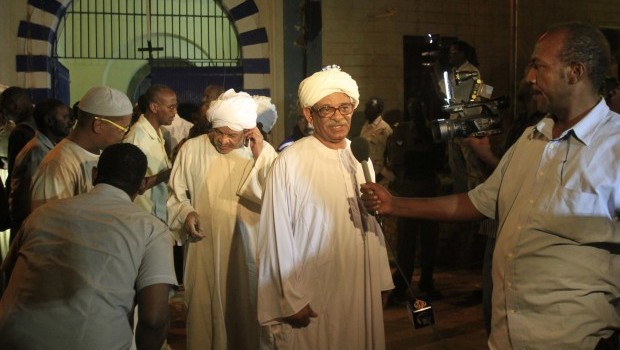
Political prisoners from Kober prison in the Sudanese capital, Khartoum, speak to the press following their release in the early hours of April 2, 2013. AFP PHOTO/ASHRAF SHAZLY
The announcement comes after Sudan and South Sudan agreed in March to end hostilities and resume cross-border oil flows after coming close to war a year ago. Khartoum had accused its southern neighbor of supporting rebels trying to topple Bashir.
“I announce today my decision to release all political prisoners,” Bashir told parliament. “I also renew a commitment to create a climate to hold a national dialogue with the other political forces.”
Bashir, in power since 1989, did not say when and how many prisoners would be released.
Rights groups have accused the government of holding an unspecified number of dissidents since the security services cracked down hard on small protests against austerity measures unveiled by Bashir last year.
In February, a UN human rights expert said Sudan was holding opposition figures and other detainees without trial and denying them urgent medical care.
Sudan’s weak and fractured opposition tried to bring “Arab Spring” protests to Khartoum, but failed to mobilize mass support.
Kamal Omar, spokesman for the National Consensus Forces grouping of the main opposition parties, said Bashir’s comments were a step in the right direction, but said more was needed.
“This is a positive move but it needs to be accompanied by action on the ground,” Omar said. “We need a climate that will allow political dialogue, freedom of expression and press freedom.”
Bashir’s comments come after Vice President Ali Osman Taha last week invited rebel groups to help prepare a new constitution following the secession of the south in July 2011.
Khartoum has accused Juba of backing rebels of the Sudan People’s Liberation Movement-North (SPLM-North) which took up arms in two border states around the time of South Sudan’s independence.
After the split, the two fell out over the position of their border, the status of disputed land, the division of national debt and how much the landlocked South should pay to export its oil through Sudan, and other issues.
Rebels of the SPLM-North sided with the south during the civil war with Khartoum that led up to South Sudan’s independence. But they were left inside Sudan after the partition.
